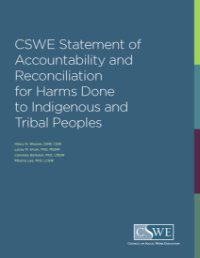Indigenous and Tribal Content
The Council on Social Work Education (CSWE) is committed to achieving social justice and equity for Indigenous Peoples in ways that respect their ancient cultures and sovereign rights and that address a legacy of colonization and oppression. Social work education strives to prepare tomorrow’s practitioners to effect social change for all people. With humility, we recognize and respect all Indigenous Peoples and their ties to the land.
CSWE Statement of Accountability and Reconciliation for Harms Done to Indigenous and Tribal Peoples
The purpose of the social work profession is to promote human and community well-being and yet there is no doubt that social workers have also functioned as agents of social control in upholding colonial and racist norms and encouraging clients to assimilate to the larger American culture.
 On June 25, 2021, the Council on Social Work Education (CSWE) Board of Directors humbly endorsed this statement which was drafted by the Indigenous and Tribal Social Work Educators (ITSWEA) as a partial account of social work education’s role in harms committed against Indigenous and Tribal Peoples and as an apology for those harms. This statement was created by educators for educators to be used as a resource in social justice, racial inequities, and social work curriculums. Download the statement here or by clicking the report cover.
On June 25, 2021, the Council on Social Work Education (CSWE) Board of Directors humbly endorsed this statement which was drafted by the Indigenous and Tribal Social Work Educators (ITSWEA) as a partial account of social work education’s role in harms committed against Indigenous and Tribal Peoples and as an apology for those harms. This statement was created by educators for educators to be used as a resource in social justice, racial inequities, and social work curriculums. Download the statement here or by clicking the report cover.
As social work educators, CSWE and its members are responsible for ensuring that social workers are educated to advance human rights and social, economic, and environmental justice in their practice. This statement is one mechanism for holding our profession accountable for ways social workers have harmed Indigenous and Tribal Peoples. Recognizing the harms done by social workers and social work educators is a step towards disrupting racism and fulfilling several commitments to social justice. CSWE urges its member institutions to join the Council and:
- Commit to active engagement across policy and practice levels to repair past harm, stop current harm, and prevent future harm to Indigenous and Tribal children, families, and communities;
- Advocate for the fulfillment of treaty and public policy obligations to Indigenous and Tribal Peoples;
- Ensure research funding, research design, data collection and analysis, oral or printed interpretations, and education about Indigenous and Tribal Peoples is driven by Indigenous and Tribal people and their protocols;
- Prioritize decolonization in social work education in concert with Indigenous and Tribal partners, recognizing that Western paradigms continue to be privileged across practice levels and that they may result in practices that are often unhelpful and even harmful for Indigenous and Tribal Peoples;
- Support self-determination of communities to build culturally congruent systems of economic, social and spiritual supports and promote Indigenous and Tribal Peoples to heal and thrive; and
- Recruit and support Indigenous and Tribal people into the social work profession at every level, including social work education.
The United States exists on the colonized lands of Indigenous and Tribal Peoples and its reach extends beyond national boundaries. These Peoples continue to demonstrate strengths and resilience despite colonization, dispossession of land, and denial of inherent rights of self-determination and sovereignty. We recognize that Indigenous and Tribal Peoples are competent, capable, and engaged in directing their own lives and futures. In no way should acknowledgement of past and current injustices contribute to dismissing Indigenous and Tribal strengths and agency. The full statement also provides an overview of Indigenous and Tribal Peoples within the boundaries of the US and its territories so that readers may familiarize themselves with many of the communities who have been the subject of colonization, racism, and bigotry.
Read CSWE's Full Land Acknowledgement
CSWE, the Indigenous and Tribal Social Work Educators Association, and the Commission on Diversity and Social & Economic Justice have collaborated on this Land Acknowledgment Statement to raise awareness of the global truth and reconciliation movement addressing historical and systemic issues of Indiegenous Peoples.
Status of Native Americans in Social Work Higher Education
In 2007, The CSWE Native American Task Force used multiple methods of data collection, including primary and secondary sources, to arrive at the most comprehensive summary possible of the current state of the social work education field. Existing sources of data included articles and books in the social work literature, government sources, materials and publications from the CSWE archives, and data from CSWE and the Minority Fellowship Program. Beyond these existing sources, additional data was collected for this study through surveys, focus groups, interviews, and text analysis. Download the study.
Connect and Discuss!
Use CSWE Spark to post content, share thoughts, and discuss resources related to Indigenous and Tribal social work and education.
A Reflection on the Importance of Land Acknowledgment Statements
Rebecca Maldonado Moore, PhD, LMSW
